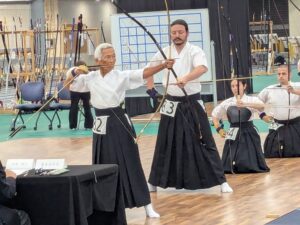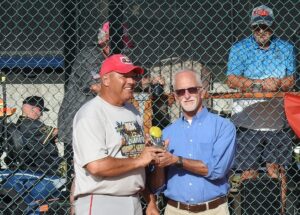Congratulations to our ladies travel team, who concluded their season with a commanding win over the Ocala Palms, Cherrywood, and Oak Run communities. The league ran from September through April.
Lulu Kerkhoff captained the team, and Michelle Marcinek took over league director duties mid-season. Additional team members included Virginia Bayless, Dianne Carrano, Debra Dematteo, Lynne Dickson, Robin Greene, Shelly Karsnitz, Debbie Radicchi, and Penny Wilson.
We may add a second ladies’ team for the next session, so if you’re interested in joining, please contact Lulu.
Congratulations also to our winter league champions. The league ran for almost four months, and with over 100 players and subs, it was the largest league in club history.
Eddie Ortiz’s team captured the league championship with the best performance and stats of any of the 12 teams in the league. Eddie’s teammates were co-captain Jim Tolson, Larry Gantt, Robin Greene, Dennis Kargul, Mike Retter, and Bill and Ruanne Wolfinger.
John Mansfield’s team was close behind, capturing second place in the league. John’s team won the Lions Division going away, with a strong six-game winning streak at the end. John’s teammates include co-captain Fred Webb, Nikki Buehlman, Don Dematteo, Ken Foster, Tim Gaffney, Art Keck, and Paul Stoecklin.
Third place in the league went to Robert Foster’s team, which also took second place in the Wolves Division. Second place in the Lions Division went to Ray Talkington’s team.
Billiards History: As we celebrate our new American pope, let us pray that he does not issue any papal edicts that affect our beloved game. For, you see, the church has long been a troublesome part of billiard history. From its earliest days, the game was often denounced as a sinful, dangerous, morally corrupt activity. In 15th-century France, billiards play was forbidden by both the church and the king.

In early American history, religious sects influenced legislation outlawing the game in many parts of the land. In Thomas Jefferson’s day, billiards was illegal in Virginia, yet he concealed a billiard room in the dome of his Monticello home.
One of these laws prohibiting billiards was passed because of a promising young Virginia lawyer who dominated the billiards scene. He spent all his time playing billiards, and his worried friends encouraged him to work seriously. These same friends were in the state legislature, and they laughingly thought that if they passed a bill suppressing billiards, then this lawyer would “never break a law!”
Their timely intervention was successful, fostering the brilliant career of John Marshall, who gave up billiards to become the legendary fourth chief justice of the United States Supreme Court, ruling the court for 34 years.




